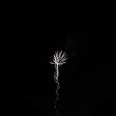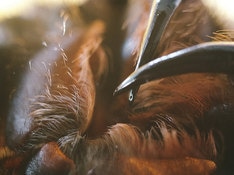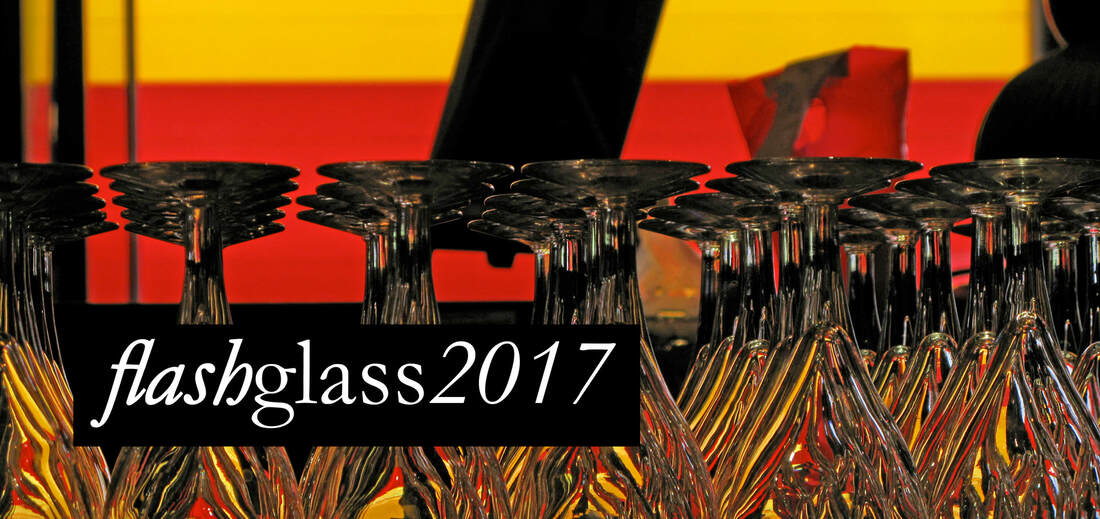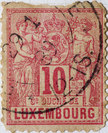|
The girl in the feather skirt gets tired of waiting for her story to start. When would the mushroomy underside of the moon explode? Darling, she writes, I’ve sold your clothes. She loves the slash and glister of her pen. By the time you read this, my ship will be en route. Here on board, gold-tasseled tablecloths sway. Petal by petal, an inchworm crosses the centerpiece of lilies and phlox. The galley door swings, dishes clink, a kettle hisses. Sometimes she strokes the cricket in her pocket for luck. Here on board, staircases unfold into silken dark and tenderness begins at its regularly scheduled time, nothing like a coin purse snapped closed. Snowflakes fall like whispers and someone keeps shaking the globe.
0 Comments
 The girl in the feather skirt opens door number two. Behind door number one are rain and hail, tornadoes, a roiling mess. Door number three conceals a hearse. She doesn’t mind silence, so she drives around her island. She just got her learner’s permit. It’s slow going, but she likes the wind on her skin, how the hearse gleams like polished leather, even the steep hills with no barriers between herself and the sea. Alone on the road, the girl tightens her seatbelt as kitchen windows blink past: a woman peels carrots: a man sharpens knives. A dog howls behind a picket fence. The girl in the feather skirt never thinks about the other doors. She hums. A door is not the story of a bright blue sky. She memorizes fractions and their decimal equivalents. She pets her skirt which she wears like an invisible shield. Like an opal, its color changes by increments, depending on the light.
Come prepared to convert the locals with your duffel bag of lipstick, ramen, t-shirts and the Good News in translation. Laugh at each challenging cross-cultural situation and tell everyone how much you love kasha. Say God loves you to the babushka who scolds you for sitting on cement, then cry as she helps you out of an open sewer grate. Embrace the homeless children who call you mildly obscene vegetable names while you feed them soup. After the near break-in, start sleeping with a bat beneath your bed. Stop sleeping. Keep your coat on at all times. Let no one in your room while you reread the book of Job. Struggle with your lust for an aging ex-con you meet at the mini-bus stop. Fall in love so hard you fall off the daybed, so drunk that soon the bedroom stops turning back into the living room. Drink Baltika No. 9 for breakfast with the shades down. Treat your sinus infection with fate. In the outdoor market, procure a wandering eye and a missing finger, a scar of unknown origin, and a knuckle prison tattoo. Eat nothing but cooked macaroni until your skin turns translucent. Teeter on spiked heels; fend off pickpockets with witchcraft. Step over the bodies by the tracks. Get on any train you want without a ticket.
The crumbling steps now lead to no one’s front door, just a miniature precipice, a leap into the slumping depression left behind when everyone had had enough of whatever it was that ground them down. Resting in the soil: shattered glass; a bent fork; the scattered shards of a dinner plate; a metal box of rain-soaked recipes. Above, the planted trees huddle, swaying like a family around a hospital bed, waiting for the doctor’s bad news, already starting to mourn, thinking of who might take the piano and whether the cousin who drinks might want to be the last occupant, or could it be rented out to a hired hand, or could the siding be salvaged for a nephew’s barn, or whether to let nature take its course.
Mark Trechock lives and writes in Dickinson, North Dakota surrounded by wheat and grass and quite a few abandoned farmsteads. His poems have recently been published in Passager, Triggerfish, High Desert Journal, Jonah Magazine, Kestrel and Red Wheelbarrow.
 Comingled blood, dark as windfall cherries, spattered lichen-streaked stones: grandfather (dead of foolishness), still-born Baby Anne—your family plot. And you might have sprung, angle and bone, from that corner yew, dark, with dark lank hair while I was mere summer folk, city girl—pudgy, pale, whiskey-colored ringlets. But on that garland branch, we pricked thumbs, became sisters. Envy grew green as island pines. Your narrow saltbox: high-ceilinged rooms, chamber pots beneath iron beds, stone-floor kitchen with hand pump and black, wood-burning stove—matriarchal dragon dominating the room, captured me. Your grandmother, brown and bony as yourself, knew things. I trotted behind as she gentled Sunday’s chicken. Ax arced, shell-carved eye stilled while deranged feathers convulsed in mad, mute tarantella. I was baptized in blood. You hungered only for trolley rides, glass revolving-doors, luncheons on the mezzanine, until you turned fifteen—one umbrella step ahead as always—left for New Orleans, a married woman. Island wives lashed tongues, raised long, red welts on your memory: Got herself in trouble. Uh-huh. I alone knew it wasn’t love or even lust that lured you; it was city lights. Had I been offered spells and incantations, I’d have gone too.
 What do you call her, this woman who flies an aeroplane? Who knows a magneto from a windsock? Whose favorite childhood poem began, How do you like to go up in a swing, up in the air so blue ... At six a swing, at twelve a rollercoaster—Ferris wheel too bland—at eighteen she’s airborne. Wings any skylark would die for. When Amelia flew through that window in time, she unlocked doors. Hand firmly on the stick, she pulls back, laughing up the sleeve of a cyclone, millions of neurons sparking in sequence, every ganglion aquiver, frisson cracking her spine clear to the tailbone. A persistent wind is inconsequential as the annoying telemarketer who uses her first name repeatedly because that’s what he was taught in annoying telemarketer school. She gazes into wide blue wonder, sky its immense self this morning, few blood-colored clouds. The boundary between here and there becomes elusive, impossible to pin down. Mystifying. Viscerally satisfying. So, what do you call her, this woman who flies an aeroplane? You call her a pilot.  Ann Howells’s poetry appears in Borderlands, Spillway, THEMA and in anthologies: Goodbye, Mexico and The Southern Poetry Anthology, Volume VIII: Texas (Texas Review Press), Pushing the Envelope and Texas Weather Anthology (Lamar University Press) and elsewhere. She has edited Illya’s Honey since 1999, recently going digital (www.IllyasHoney.com) and adding a co-editor. Publications include: Black Crow in Flight (Main Street Rag), Under a Lone Star (Village Books), Letters for My Daughter (Flutter), and Cattlemen & Cadillacs, as editor, (Dallas Poets Community). Ann served as President of Dallas Poets Community for four years and as Treasurer for many more.  Petrichor: as in the smell of the earth after it rains. As in nitrogen filtered through the ground. As in the scent I remember on the night that I met her. The night was alive with wetness, a happy wetness, a boisterous but distant challenge from thunder. How soft and smooth the air felt once the clouds stopped shedding. The frogs were cloaked in darkness as they voiced their mating calls, the moon just beginning to pierce the overcast curtains the sky had drawn. And the smell! It was like the dark musk of the earth. Assemblage: as in a small gathering. As in two is a pair, three is a crowd, but five makes a party. I was invited into the dorm by a new and lovely friend. Her face held an assemblage of freckles, her eyes framed by large-lensed glasses. She took my hand, which surprised me. She led me to her room where three of her friends were already drunk. She was a microcosm of atoms, assembled into a woman. The light was low, the window open to the weather, rain still dripping from the wooden pane. Lissome: as in slender or graceful. Though her name, Katie, was sharp, two staccato syllables connected by a broken hinge, it was as if her body was dancing even when she was standing still. I watched her silhouette in the dark as we listened to hip-hop, as she settled into my lap. The circle of tipsy college students was pulsing, hearts in synch, dreams aligned. As she sat, her arm around my neck, her face close to my cheek, I could smell the perfume she wore. She smiled then, and I was lost. Scintilla: as in small thing or small spark. A quark at first, growing hotter as my desire grew. She threw back her head and laughed. Some scintilla, some flare, finally burst, illuminating the moment. I could not stop looking at her as she stood, her hips swaying to the music. When she sipped her glass of wine and looked at me, her eyes glowed, much like mine must have been, and there came a scintilla of recognition. Dalliance: as in a short love affair. We spent all of our time learning about each other. We learned to speak softly, honestly, together. Some nights were spent doing nothing, lying in her bed as the moonlight stretched across our bodies. We talked of the past, and of the present. We talked of the future, how uncertain it was. We wrote silly love letters, poems blistering with amity and candlelight. Imbroglio: as in a complicated situation. Angry words, bitter tears, and the fear that loneliness brings. Months after the breakup, I found myself clearing space for her in my life, clearing space for more stories. If we decided to reunite I might treat her better. I could not seem to let go. Eventually I realized that dwelling on something that might never happen was leeching away my life. Still, I held on to her words as I began to move on: things work out because they have no choice, she had said, even if they’re not how we expect them to. Ephemeral: as in fleeting, temporary, impermanent. The smell of the earth after it rains, or a small gathering in a college dorm room. Youth and beauty. A spark after a flame has been doused. Short love affairs built on sand, each grain sparkling with vanity. Ephemeral as the complexities of a failed relationship, a bitter stain washed away only with time. Time too is ephemeral, each second fleeing into the unknown. Listen: take what you think you can’t bear to lose, and cherish it. Then give it to the night.
 I tried to kill her once. My sister. My spider. More than once, actually. I tried smothering her, starving her out, slipping an x-acto knife between her abdomen and mine. Jamming a fork into her eyes. Nothing worked. Once or twice, she sunk her fangs into me when I tried, but the venom that made everyone else crawl and weep at my feet had no effect on me, just sizzled against my skin. Every time I tried to kill her, I imagined she’d drop off of me like the withered black stump of umbilical cord my mother pasted into my baby journal alongside pictures from the day I was born: me, tiny and pink and wailing; my spider, her soft exoskeleton already hardening, all eight legs waving over my chest; and my parents grinning at the camera, exhausted and giddy and terrified of what came next, when they’d have to leave the hospital and take me home. They weren’t scared of my spider for whatever reason, but plenty of people were, and my granddad insisted we should have been drowned at birth. I couldn’t help but see his point—I mean, I looked normal. But then my shirt would ride up or someone would hug me, and the day would end in screams and a visit to the emergency room. My spider bit besties and boyfriends and lab partners. We ran out of mice once, and she bit my cat. I woke to bloody sheets and a cat-shaped burrito of silk laying next to me, and my spider, looking well-fed and clicking happily. I suppose she was terrifying, but the thing I couldn’t stand was how everyone blamed me. Why couldn’t I control her? Or at least keep her to myself? My life would be great, I thought, without her hanging around on dates. I could cancel the pet store’s standing order for white mice. I could shower at the gym! Maybe one day I could have sex with someone—anyone—without having to explain that it could kill them. After years of grad school and shit jobs and ACE bandages tight as a tourniquet to smash my spider down under my dress, I bought a big black can of arachnid Raid and sprayed it in her face. I watched her legs seize and flail until a terrible burning sensation flooded my limbs. I hoped it was the feeling of her dying. It was not. I ended up in a slick pastel terror of a psych ward and endured weeks of tests and meds and group therapy till the doctor said I was stable and unlikely to take my life— that’s how she put it: your life. Just the one. She put up a scan from some fancy new imaging machine she’d developed after the dead started waking up. The image was like a cloudy x-ray, a blue blur of breastbone and ribcage, carapace and thorax, and— “Your soul made manifest,” the doctor whispered. My spider wasn’t just attached to me, she was me—my inside out. It took me a long time to get my strength back after that, a long time to get used to the fact that there was no undoing us. And then we hunted, and it erased every wasted night spent crying into deep glasses of wine, all those fumbling moments in the back seats of cars with boys I hoped would make it out alive. All of that shrank to nothing compared to the feeling of choking the life out of one of them, the satisfying shudder and shake of his limbs as my spider’s poison loped through his veins. Weren’t we lucky? Hardly anyone knows what they’re made of. Hardly anyone knows what they’re for, but I licked bloody tears from his face and knew I would never have to be as bored or alone as I would have been with him. Never again.  Erinn Batykefer earned her MFA from the University of Wisconsin-Madison and is the author of Allegheny, Monongahela (Red Hen Press) and The Artist's Library: A Field Guide (Coffee House Press). She is co-founder and editor of The Library as Incubator Project, and lives in Pittsburgh, Pennsylvania. |
FLASH GLASS: A MONTHLY PUBLICATION OF FLASH FICTION, PROSE POETRY, & MICRO ESSAYS
Categories
All
Cover Image: "Yellow Red Wine Glasses, Paris"
|
|
Glassworks is a publication of Rowan University's Master of Arts in Writing 260 Victoria Street • Glassboro, New Jersey 08028 [email protected] |
All Content on this Site (c) 2024 Glassworks
|












 RSS Feed
RSS Feed
